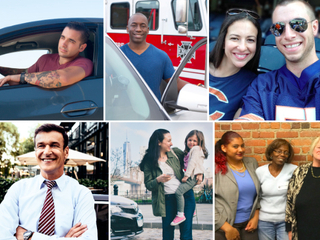The FDA outlines draft guidance on AI for medical devices
The agency also published draft guidance on the use of AI in drug development
Read more...Editor's note: Our Post Seed VC event is coming up on Dec. 1 in San Francisco. We'll have Chamath Palihapitiya (Founder of Social Capital), Aydin Senkut (Felicis), Jeff Lawson (Founder & CEO, Twilio) and more. Check out the full lineup and register for tickets before they jump! Post Seed is brought to you by Vator, Bullpen Capital, and Haystack.
 Are Uber drivers employees or independent contractors? A court in London says the former.
Are Uber drivers employees or independent contractors? A court in London says the former.
A London employment tribunal has ruled that drivers for the ridesharing company are employees of the company, not independent contractors, which means they’re entitled to a minimum wage, paid breaks, vacation pay, and other benefits.
Uber has already said that it will appeal the ruling.
“The overwhelming majority of drivers who use the Uber app want to keep the freedom and flexibility of being able to drive when and where they want,” said Jo Bertram, Regional General Manager of Uber in the UK in a statement emailed to VatorNews. “While the decision of this preliminary hearing only affects two people we will be appealing it.”
The company says more than 40,000 people drive for Uber in the United Kingdom today. While their statement makes much about the fact that only two people are involved in the London case, in stark contrast to the tens of thousands of people using the app, this leaves out the fact that Uber has faced similar legal battles here in the U.S.
In a colorful report that quotes Shakespeare and Milton, the London court cites a judgment from one of these cases:
Uber does not simply sell software; it sells rides. Uber is no more a "technology company" than Yellow Cab is a "technology company" because it uses CB radios to dispatch taxi cabs.
“We respectfully agree,” wrote the London tribunal.
That quote was lifted from the California District Court ruling in Douglas O'Connor vs. Uber, in which 385,000 Uber drivers (in California and Massachusetts) had objected to their classification as “independent contractors.” Uber eventually settled with the drivers for $100 million, but left the classification in place—a clear win for the deep-pocketed tech company.
A few months later, however, U.S. District Judge Edward Chen threw out the settlement.
The latest ruling by the London tribunal goes directly against one of the core tenets of Uber’s chief business model, which relies on a steady stream of self-employed drivers to support the platform’s success. Over the past few years, Uber has vehemently argued in courts and marketing materials that its drivers love the flexibility and ease of working on their own terms.
But while it can be a simple way to make money, it may not be a reliable form of income in the long term.
Even Mitch Kapor (co-founder of the Electronic Frontier Foundation, Kapor Center for Social Impact, and Kapor Capital), who invested in Uber in 2009, admitted that driving for the company is "a great second job, but not a great primary source of income."
Of course, this isn’t the end. Uber will likely fight the London court’s ruling tooth and nail to get the thing overturned.
The agency also published draft guidance on the use of AI in drug development
Read more...The biggest focus areas for AI investing are healthcare and biotech
Read more...It will complete and submit forms, and integrate with state benefit systems
Read more...Startup/Business
Joined Vator on
Uber is a ridesharing service headquartered in San Francisco, United States, which operates in multiple international cities. The company uses a smartphone application to arrange rides between riders and drivers.



